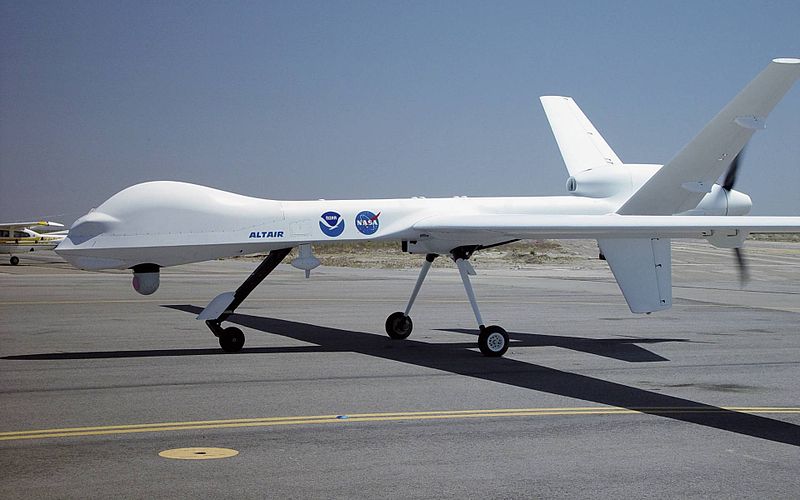Why Drone Warfare is So Controversial
 “As an idealist my desire is to live in a world in which there is no need for targeted killings of terrorists,” commented Brad from Arizona on last week’s high-profile and somewhat disturbing New York Times piece about Obama’s “Kill List.” But I would hope that we all, idealists and realists alike, desire to live in a world in which there is no need for targeted drone strikes in the Middle East. Understanding the debate on targeted killings through the prism of “realism versus idealism” is not useful, particularly because it is not really a debate between realists and idealists. The acceptability of targeted killings, alternatively, touches on a deeper and more important debate between differing understandings of America: between American exceptionalism and what I will call “American normalism.”
“As an idealist my desire is to live in a world in which there is no need for targeted killings of terrorists,” commented Brad from Arizona on last week’s high-profile and somewhat disturbing New York Times piece about Obama’s “Kill List.” But I would hope that we all, idealists and realists alike, desire to live in a world in which there is no need for targeted drone strikes in the Middle East. Understanding the debate on targeted killings through the prism of “realism versus idealism” is not useful, particularly because it is not really a debate between realists and idealists. The acceptability of targeted killings, alternatively, touches on a deeper and more important debate between differing understandings of America: between American exceptionalism and what I will call “American normalism.”
Dennis Blair, the former director of national intelligence, revealed to the Times why the U.S. government conducts the strikes. "It is the politically advantageous thing to do--low cost, no U.S. casualties, gives the appearance of toughness. It plays well domestically and it is unpopular only in other countries. Any damage it does to the national interest only shows up over the long term," he said. But this doesn’t make sense. Its unpopularity overseas, and damage over the long term, would seem to make drone strikes politically disastrous. Unless, of course, foreign opinion were of no real consequence and the future would always hold good things for the U.S. In other words, only if one believes in American exceptionalism.
Rooted in John Winthrop’s “City Upon a Hill” and Thomas Paine’s Common Sense, this theory sees America as wholly different from the rest of the world. The United States is a global force for good, and can reach into other countries to uphold that good. Defense Secretary Leon Panetta explained that these drone strikes “protect and defend the United States of America.” But only America protects and defends itself in this way. Only America can engage in a war and expect the casualties to be one-sided. Harold Koh, Obama’s top legal advisor, explained in 2010 that targeted killing is legal because America has its right to self-defense. But if self-defense can exhibit itself this way, it establishes a worrying precedent. A nation like Pakistan, or China, could now launch drone strikes on American soil. But this is unimaginable to the American exceptionalist because only America can, or should, have such a power.
But there is an alternative theory: that of American normalism. On May 31, the Washington Post reported: "Across the vast, rugged terrain of southern Yemen, an escalating campaign of U.S. drone strikes is stirring increasing sympathy for al-Qaeda-linked militants and driving tribesmen to join a network linked to terrorist plots against the United States." And this is happening for good reason. The American normalist believes that America is no different from the rest of the world, has no mission to fix mankind, and must respect borders. To the normalist, America’s targeted killings are an improper, illegal, and even immoral breach of Middle Eastern sovereignty.
And it goes further. In the Middle East, American exceptionalism has, quite understandably, been perceived as American imperialism. Drone warfare is only the latest incident in this worldview: in The Crisis of Islam, historian Bernard Lewis recounts allegedly imperialistic American action in Lebanon, Khartoum, Libya, and, of course, Korea and Vietnam. Operation Iraqi Freedom is, conversely, Operation Iraqi Colonization. Drone warfare, similarly, is a preposterous invasion of sovereignty, particularly nasty because it kills its victims without giving them a chance to surrender or providing them with a trial in a court of law. Regional sympathy for al-Qaeda is not so surprising.
Neither theory is right or wrong; but it is important that they be considered together. American exceptionalism has guided much of America’s foreign policy throughout history, but those in the Middle Eastern countries in whose affairs America is meddling are understandably worried by America’s far-reaching arm. So while Obama may find his “kill lists” to be politically advantageous, he and his administration must recognize that these lists are morally disadvantageous. They must recognize that while the president may be able to ponder who to kill miles away, the rest of the world does not believe that America legitimately has the right to do so. And they must recognize that while drones continue to kill almost daily—a senior al Qaeda leader, Abu Yahya al-Libi was killed just today—and have killed up to 3,000 people since their inception, many in the Middle East may just decide that it is time to fight back.

